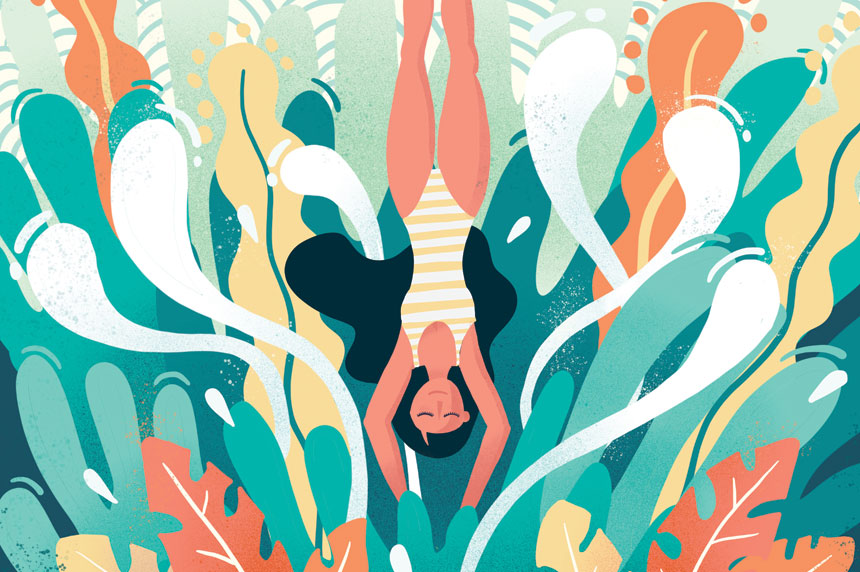Every week for the past year, I’ve plunged into the North Pacific. By choice.
On Thursday mornings, I drive 20 minutes to join the Doran Dunkers at Doran Beach, a stretch of muddy sand that curves around Bodega Bay, north of San Francisco. The bay has an average year-round temperature of 53.6°F, or, technically speaking, really effing cold.
On a windy, misty, gray-rainy day — that is to say, most days — it feels even colder. We plunge without wetsuits, but with plenty of shrieks and swearing.
The other Dunkers change into swimwear on the beach, attempting discretion and modesty with the use of large towels and swift movements, but I arrive sporting my turquoise, tropical-flowered swimsuit under thick sweatpants and hoodie. As the others strip down, suit up, and do warm-up stretches, I sit on the rocks and stare at the gray water in dread.
At the lip of the bay, icy brown wavelets chill the sand and dampen the shining, tangled clumps of camo-colored, washed-up kelp. It is not terribly appealing.
I walk down to the water’s edge grimly. My surf shoes insulate my feet so I don’t feel the shells and sea-muck underfoot. Once my feet are wet, I’m committed, and keep stepping stolidly forward, not letting myself pause till I’m up to my waist.
By the time the water reaches my ribs, I’m hyperventilating and have to stop to calm my heart. I feel my legs getting numb; I feel my life about to end. I hold my arms up high, with fingers extended and shoulders hunched. As the waves slosh around me, I stand on tiptoes, shrieking, “I am never doing this again!”
I say this every week, and every week, I mean it. My body perceives the cold as a threat to survival, which it actually could be if I stayed in more than a few hours, and my mind screams for me to get back on land. I yell, “This is awful! Why are we doing this?”
No one answers. My friends are straggling in, some stuck and silent in the shallows, undergoing God-knows-what mental calisthenics to get themselves fully wet. The toughest and bravest one, Andrea, plunges forward, passing but not splashing me. Arms in a V, she dives under and comes up gasping. She swims out deep.
I think about sharks, and then I make myself stop thinking about sharks, and in particular I don’t think about the purported 300 Great Whites that live, breed, and feed in waters around San Francisco. Fortunately, I have a secret shark-safety rule: Always make sure that some other Dunker is farther into the ocean than I am.
Above the complaints in my own head, I dimly perceive other people’s:
“What did I just step on? It moved!”
“Ugh! I just got slapped in the face by a wave!”
No one responds to anyone else; each of us is wrapped in her own, awful, individual experience, like the people screaming in the death scene in Titanic. But we’re not alone, and we’re not freezing to death. Really.
In a few minutes, I’ll be okay, I think, and force myself to crouch down, shocking my nipples. The worst part is dunking my shoulders, especially if they’ve been warmed by the sun (how fortuitous that it’s usually overcast!).
Then, up to my neck in opaque, shark- and seal-friendly water, I stay still, braced against the current. I don’t take a step, because moving any limb makes it feel even colder. Nor do I swim much, because I don’t like getting my head wet. There’s no health advantage to doing so, and the “ice-cream headache” adds to the misery. A few people do some breast stroke or freestyle, but mostly, we tread water and hover in place, tense and nervous as hummingbirds.
In our matching, absurd, peach-colored swim caps, most of us dunk only up to our necks, but we stay dunked for about 20 minutes. We’ve read that 18 minutes is optimal for health benefits, and we usually can’t stand more than 25.
Being the heaviest member of the group gives me the advantage of being able to stay in longer than most people, sometimes half an hour past when the svelte women have to get out. The weight I usually want to lose is a great insulator in the ocean: I am like a seal.
My personal endurance record is 45 minutes. On that day, the wondrous effects of a lowered core temperature lasted till the next morning. I had no pain anywhere in my body and slept well that night.
But the physical benefits aren’t really why I do it.
Our ragtag gang of around eight mostly-middle-aged women is doing what thousands of people worldwide started during the pandemic: taking cold plunges in mountain ponds, cold coastlines, and even ice baths. But why?
The scientific research is plentiful but inconclusive. It’s virtually impossible to conduct a controlled study of cold-ocean bathing, because so many variables come into play: the ages, genders, and mental and physical health of the individuals plunging; the season, the wind and waves, and the air and water temperatures; how long the bathers stay in, how often they go, and protective gear worn (or not).
But the research that does exist indicates the possible benefits of plunging: boosted immunity and circulation and decreased stress, inflammation, and depression. There’s also plenty of evidence that cold-water immersion can threaten people with heart conditions or high blood pressure (not to mention what some studies call the “psychological discomfort”). But all the studies show one consistent conclusion: People who regularly get into cold water feel better!
After the first five (or ten, or more) minutes, the agony is over, replaced by surprise and pleasure that we are surviving. We start to move around, turning in place, forming loose circles, or swimming a few strokes. Sometimes we make up songs or improvise water ballet, doing back somersaults or pointing our toes in the air.
“How long has it been?” someone asks the woman with the waterproof watch.
“14 minutes, 50 seconds,” she says.
“Let’s stay another five!”
As we grow physically numb, we emotionally warm up. After a quarter-hour, we’re chatting to each other, sometimes admiring the clouds or sailboats, and looking out for seals (they can be ferocious in pup season — Dunkers have been bumped by annoyed underwater mamas). Mostly, we laugh.
I feel close to everyone in the group then, though actually only one or two Dunkers are my friends. I don’t know any of the others, and I don’t see them anywhere else. But on the beach, Thursday mornings, they’re my best buddies.
When it’s time, we emerge from the water in twos or threes, moving up the sand to where our rainbow of towels, clothes, and thermoses wait with the promise of dryness and warmth. I rinse off under the unheated, outdoor shower on the beach, and it feels hot.
My après-dunk movements are extremely slow, and I’m as uncoordinated as a drunk. It requires great planning and intense effort to pull a poncho over my head and slip down the straps of my bathing suit. Drying myself with a towel seems nearly impossible, and putting on pants is impossible, which is why I bring a loose, elastic-waist skirt to pull up and wear like a dress. Undergarments are unthinkable.
The post-dunking hour is the best part of my week. I’m pain-free and proud of us for doing something hard.
As we get re-dressed — no longer caring who sees us naked or not — sometimes a passerby stops and asks if we’re in the polar-bear club, and if we’re crazy. “Isn’t it cold?” they ask us.
“Yes,” we tell them. “It’s cold, but it’s great. You should try it.”
Once in a while, a new person does join us. Usually they come in for only a moment, in the shallows, and then rush out, ignoring our shouted encouragements: “Don’t leave now! It will get better!” Newcomers rarely come back.
In my early days of dunking, I once went in alone, on a day no one else showed up. Getting in was misery, and even after I numbed up it didn’t get any better. I was alone in a huge bay, with who-knew-what jellyfish, seals, or sharks. But it wasn’t the wildlife that bothered me; it was awful because I was alone.
Every week, we go into the water separately, each one with her own worries, each facing her own fears and struggling against her individual survival instinct. But we emerge as a giddy, exultant group, full of salty adrenaline and endorphins, nearly hysterical with relief and appreciation for existence. We’ve survived! We can drink hot tea! We don’t have to do this for another week!
No one minds how long it takes to change into dry clothes. Numb hands make it hard to do up buttons or zippers, but we help each other dress; we share thermoses of hot tea. Damp and chilled, healthy and happy, we take a picture every week and share it on group text. In the photos, our skin is hot pink and our hair is lank as seaweed, but our faces are bright and exultant.
Having lived in both hemispheres, five countries, and seven states, Gillian Kendall has “settled” in Northern California. Her next book will be Notes from the Strangers’ Corridor: A Story of Editing, Insomnia, and Minor Mental Illness, from Australian Scholarly Press.
This article is featured in the July/August 2025 issue of The Saturday Evening Post. Subscribe to the magazine for more art, inspiring stories, fiction, humor, and features from our archives.
Become a Saturday Evening Post member and enjoy unlimited access. Subscribe now




Comments
I, too, always feel much better after time spent in the pool; however, I prefer a therapeutic warm temperature. The community of swimmers has created a sanctuary where I feel welcome and loved.
It makes me wonder how much the temperature of the water really matters or if my body appreciates the movement and my heart the community, which really matters.
No matter, keep swimming!
I really enjoyed your story, Gillian, but I still have to ask why?!!! It sounds like torture! Good on you for your commitment and comradery!
Jill,
I enjoy your writing because you have the ability to paint pictures with your words. You have earned my admiration for being able to get into and stay in ocean water which is freezing, unappealing in color and scary . I have done plenty of snorkeling and scuba diving and have seen what is lurking under the water.
Please keep sharing your articles , I truly enjoy your writing. I already ordered the book from Australia but it’s taking a bit long to arrive. Maybe it’s been shipped on one of the slow boats from China which you worked on.
You make me want to try! I live swimming. Only once have I raced in cold wster-but eith a wetsuit on, i can imagine the challenge of getting in , whule the group support sounds very warming
It’s interesting how our relationship with others is crucial to our living … even when it’s temporary or circumstantial.
Your story is beautiful and captures that perfectly
An inspiring article, all the details make me think about finding a “dunk” group myself and jumping in. I almost feel as if I have dunked already !
Brrrrrrrrrr! Glad I read this rather than lived it. A deft, intriguing article about something I’ve never done, and now I feel I’ve no need to. Gillian has gone bravely into the icy depths for all of us. A great, quirky, exhilarating read from a fine writer!
Very funny and quite inspiring!
Well, I take my hat off to you, too, but I’m afraid it’s not for me. I got cold just reading about it. It’s cold enough in Northern California without going in the damn ocean! (Plus, I have the excuse that I have high blood pressure.)
Onya Gillian, as we say in Oz. (Translation: good on you, Australian slang )
Reading this in a warm bed on Sunday morning, I have to admit I’m not tempted to try it. But I do like bush walking in cold weather with the gum trees dripping rain and mists rising. A similar effect of starting cold leading to the exhilaration of getting warm from exertion. And, with the great benefit here of no snakes and flies.
Lounging in the sun, I chuckled warmly at your freezing expense, Ms. Kendall.
(Monitor that heart rate. It can creep up on you!)
This piece is not only well written, its inspiring and I had some good chuckles reading how you all enter the water. You captured subtle details that drew me into the experience, I felt like I was with you.
And it brought back memories of my own open swim and dunk days many years ago.
Here is to your courage!
I love this so much. The humor. The misery. I found this not only entertaining, but inspiring. Gillian’s descriptions – of both external and internal threats – are exemplary. I want to read more, please!
Gillian, I take my hat off to you, even though I’m not wearing one. You and your friends are getting a lot out of this ice cold weekly ritual, or you all wouldn’t keep doing it. As for myself, I’ll chance a ride in a Waymo first. Will it go round in circles? Probably, but at least I won’t be freezing. You’ve got way more guts than I do. Here’s a warm hug!